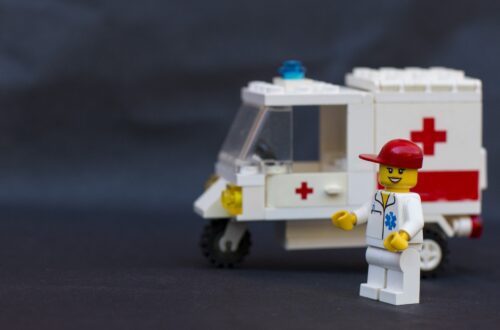by Beks

Remember how I said my son’s ER bill was just shy of $1,000? Whelp, I was wrong. Turns out, the first bill was from the doctor. A second bill arrived in the mail from the hospital. Apparently, they don’t bill together. That would just be silly.
The second bill was for $2,000. $2,000!! Holy moly! The total cost for stitches on my son’s chin was $3,000! I called the hospital to negotiate a lower rate. Dave Ramsey swears this is possible. It’s not. The hospital refused to budge. They offered to let me make payments for 6 months.
Here’s the deal. I have $2,000 in my HSA but it’s invested and doing well. I know I’ll have bigger health or dental expenses in the future so I really don’t want to touch that if I can avoid it. I have $2,000 in my emergency fund and yes, I consider this an emergency, but that’s invested as well. Easy to pull out if needed but same reasoning here, I don’t want to touch that money if I can avoid it. So that leaves me here…staring at debt??
I can afford the monthly payment and the hospital charges no interest to spread this bill out over 6 months. Financially, that makes the most sense but I’m reluctant to take this option because I consider it debt. Owing someone. Making payments. Sounds a lot like debt. My husband disagrees and wants to make the payments.
This is a good time to stretch my brain and think of other ideas. There’s got to be something I can do that doesn’t involve pulling money from my emergency fund or my HSA. I looked at my categories for places I could ‘rob Peter to pay Paul’ and I focused on the car replacement fund. It’s not invested and I don’t plan to use it in the next 6 months. I can pull it from there and make 6 months of payments back to the car replacement fund. Not optimal but if I really get into a bind, I can make a claim to the HSA to get that $2,000 and put it into the car fund.
I’m curious though, if I didn’t have the car fund to borrow from and made payment instead, would you consider that debt?

Beks is a full-time government employee who enjoys blogging late into the night after her four kids have gone to sleep. She’s been married to Chris, her college sweetheart, for 15 years. In 2017, after 3 long years working the Dave Ramsey Baby Steps, they paid off more than $70K and became debt free. When she’s not working or blogging, she’s exploring the great outdoors.


This isnt “debt”. You have the HSA funds to cover it, you are just choosing not to use it. Just stop.
I disagree with your logic here. If I take out a car loan but I have money in my account to pay it off, it’s still debt. Sure, I’d have a positive net worth, but I would be carrying a debt.
I don’t think it really matters. But if it makes you feel better, and you have the money in the HSA, just go ahead and pay it. That’s what the HSA is there for, after all. If you choose to make the payments, keep the receipts! Then, whenever you do decide, you can take that out of the HSA tax free, even if its years from now. In the meantime that money can make returns for you.
True!
Your logic is a little backwards. Also your emergency fund should not be invested if it’s only 2000$! Take the 6 month interest free payments and cash flow the payments. It’s a no brainer. At a certain point not all debt is bad.
My emergency fund is fully funded (6 months). It’s not $2k. I misspoke, it’s not ‘invested’ but it’s in a money market account.
Sorry! Misspoke. Emergency fund is in a money market account earning interest.
It’s tempting to take the payment!
If you have the money in a money market account just pay the bill straight out and get it done. I wouldn’t want to let it sit around for 6 months making payments. It would be a little over 300 dollars a month to the hospital. If you wanted to I’m sure that you can pay the bill right from your account and replace that money just as quickly.
Why is your emergency fund invested (in the stock market I assume)? The point is to keep it in something non volatile so it’s there when you need it, and avoid getting hit with a double whammy, like say you lose a job due to a recession and needing the money just as the stock market hits a low.
Usually you can only negotiate bills if you’re otherwise uninsured, since the insurance company is providing you prenegotiated rates otherwise.
If you’re not maxing out your HSA already, I’d just clear out the HSA and just pay yourself back the installments into your HSA account. It ultimately lets you get more tax advantaged money in that way. The only part of my HSA account that is invested is the amount above the yearly max out of pocket, that way I’m not worried about using it for it’s intended purpose.
Sorry, misspoke. Not invested in the market. It’s in a money market account earning interest and it’s at a different bank than my daily bank. I like to make it difficult to get to!
I’m not maxing out my HSA at this point since my budget is tight but that’s the goal.
Ah well then I really wouldn’t worry about missing interest on $2k over a few months in this environment. If you do end up doing some kind of cashflow make sure to filter it through your HSA (you can literally just put in then immediately pay the bill) to get that extra tax savings.
This idea is GENIUS!
I think you should cashflow the six interest-free payments. That way your cushion is undisturbed. I wouldn’t beat yourself up or worry about how to label it. Just be happy you can cover the expense.
I like this perspective! Sometimes I overthink!
It’s debt but it’s interest free so I wouldn’t consider it a problem. That said, I also probably wouldn’t choose that option if I had a choice because whatever investment or interest gains I would have made over that period would be offset by the annoyance of having to think about it. (And I prefer to keep my emergency fund in a savings account for that reason – in general, I think an emergency fund shouldn’t be invested.)
Sorry, I misspoke. Our emergency fund is in a money market but since it’s ‘working’ earning interest (not much but something), I don’t like to touch it.
I can understand your pondering. If the hospital allows for payments over 6 months at no interest, that is the option I would take. I would cash flow the bill. I feel much more comfortable having funds still working for me and ready to use should something happen and I cannot cash flow the bill.
I completely agree.
I’m amazed the hospital doesn’t have allow financial assistance if you fill out a mountain of paperwork! I wonder if it’s worth researching a different angle here?
FWIW, I would do the monthly payments at least to start. It’s easy enough to pay it off in bulk later.
We tried to negotiate but the hospital wouldn’t budge which was surprising since we’ve had a reduction in salary due to COVID.
That’s the flip side of a high deductible plan with low premiums, you are taking a chance you won’t need healthcare, and if you do you get hit with big bills. I would use your HSA, that’s what’s it’s for. I agree with the mindset that even if it’s interest free, a payment plan feels like debt.
Yup! Definitely a risk with those HSAs!
I would say its debt. It’s money that will be spoken for each month for six months. That being said if you are getting a no interest opportunity to pay for six months I agree with the hubby. I wouldn’t derail other parts of the budget if I could avoid it especially if you can afford the no interest payment.
My husband would love that so many folks agreed with him.
Yes, making payments to the hospital is debt. No matter how you slice it, it is considered debt. I would use the HSA for what it is for and make the payment. I have been successful in getting a 5% cash payment discount. Why have a $300 per month payment if you don’t need to?
That’s a good idea!
I would call it debt but it’s minor. What a bummer of an insurance plan that doesn’t have just a copay for an er visit, or at least an 80/20 split.
We were very shocked. It seems so high! Supposedly HSA negotiates lower rates but the bill says otherwise.
It is debt if you take the 6 months of payments, but I wouldn’t stress over that either way. However, you really need to have your full deductible saved for access if you have a HDHP. Ideally, you would have your OOP max and replenish each year. HDHP are often a better deal each year (ours is cheaper in most cases with Deductible+Premiums, so it is a no-brainer) but it is a mindset change where accessible savings occurs. I say this as someone who met their family deductible in March, so I am sympathetic.
Great idea! Yeah, it’s rough burning through so early in the year!
I have had good look with getting a discount if I offer to pay in full. Sometimes I will say would you give me a 10% discount if I can pay in full today.
In my experience, as long as you send *something to hospital billing they have to accept it & not send anything off to collections. You have money available if you choose to pay it in full, but there are options.
I guess technically it’s debt but with 6 months no interest, that gives you time to come up with adjustments to your budget to make those payments so I think it would be worth it. And like you said, you always have the money in the HSA if you need it.
I am amazed at how much $2k has solicited responses. My 2 cents. Be definition it is debt. What I am confused about is why are you spending so much time and effort thinking about this. Just do what feels right. It is not worth the extra expended and energy to stress over it. If you want the cushion or investment earnings, pay it over 6 months (that is what I would do and I have no debt, substantial savings (2 years worth of salary), etc. If you don’t like it after a month then pay it off.
I would go with the 6 month plan. If you’re in a position to make the payments no worries. Your HSA wiil be better for the long term needs. Can believe the bill for just stitches!! Good lord!
I think it is silly not to take the payment plan if the money is earning interest somewhere else. I’d also call back and try to negotiate either a “cash immediate pay” discount. Or you can call again, try to negotiate a discount. You can have a totally different outcome talking to a different representative.
I also think that all debt is not bad. Yes, it’s debt, but if you are paying it off (and have the means to pay it off fully), then it is debt you are making work for you.